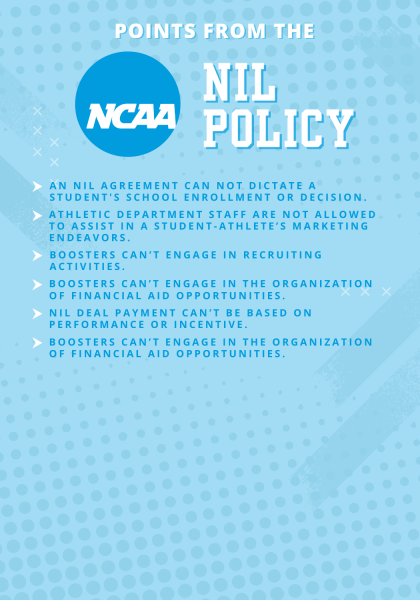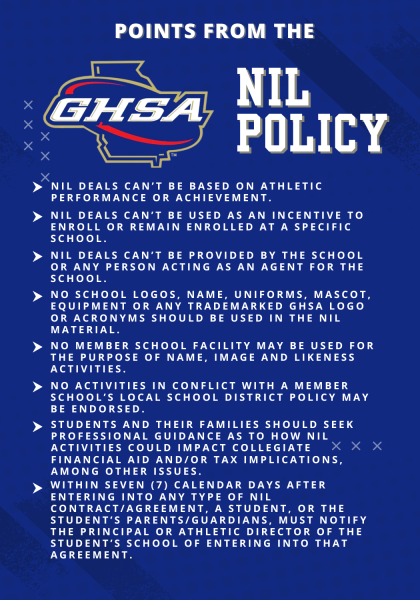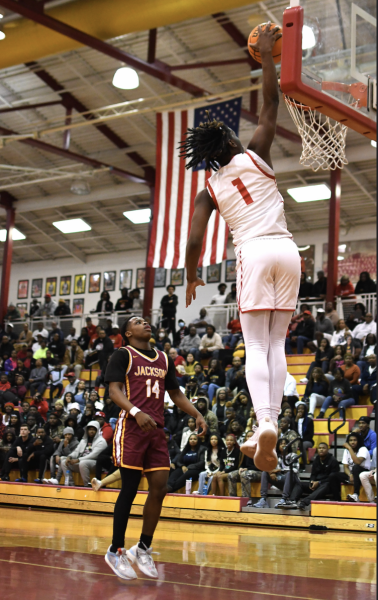An illustration depicts a high school student athlete being featured on a billboard promoting a “DRINK!” as a part of a name, image, and likeness deal. Clarke Central High School head varsity football coach David Perno expressed his concerns regarding NIL. “(NIL) brings up a dynamic that you never had to worry about. There’s just less value on the team and winning than there is getting paid for your NIL,” Perno said. Illustration by Eleanor Robinson
The Georgia High School Association permitted NIL deals for high school athletes on Oct. 2, 2023, changing the game in high school sports, literally and figuratively.
Name, image and likeness (NIL) are the three aspects referred to when discussing an athlete’s ability to market themselves.
The concept is not new to the athletic world, but it has become a recent topic of national contention as college athletes began advocating for their rights to profit from their careers as athletes.
Dr. David Welch Suggs, an Associate Professor at the Grady College of Journalism and Mass Communication at the University of Georgia, explained that the athletes’ demand is a historically taboo topic.

An infographic depicts the main ideas of the National Collegiate Athletic Association’s name, image, and likeness policies. GHSA Executive Director Dr. Robin Hines proposed the prospect of an NIL policy for the GHSA. “When (NIL) started cropping up, I didn’t understand what NIL was either. I thought it was paying kids to play football or basketball, and it’s really not. When you look at it, name, image and likeness are an individual’s right to publicity,” Hines said. Infographic by Cadence Schapker
“There’s been this insistence that athletes should not be able to profit from being athletes, either in high school or college,” Suggs said. “That’s been this law both with the (National Collegiate Athletic Association), but also with the high schools going back all this time – that there’s something pure and noble and amateur about sports, and we want to protect athletes by saying, ‘You cannot make any money. You cannot receive any money outside of scholarships to compete in sports. You can’t use your sports to make money.’”
Due to this precedent, the NCAA prohibited college athletes from accepting money for any aspect of their athletic career up until 2021. However, with the passing of California’s Fair Pay to Play Act in 2019, the first legislation permitting NIL deals for college athletes, conversations across the rest of the country arose. This conversation reached Georgia when Governor Brian Kemp signed House Bill 617 into law on May 6, 2021—allowing Georgia college athletes to sign NIL deals.
“I honestly felt that through legal action, (the GHSA was) going to be forced into (permitting NIL).”
— Dr. Robin Hines,
Georgia High School Association Executive Director
In response to the wave of states and institutions legalizing the practice of NIL, the NCAA installed an interim NIL policy, permitting the marketization of college athletes on July 1, 2021.
Since making this decision, college athletes nationwide have made brand deals worth thousands of dollars. Among these players is UGA football players like Carson Beck, whose NIL valuation is reportedly $1.5 million, according to On3.com. This new freedom for student-athletes causes mixed feelings for people such as retired Woodward Academy track and field, football and basketball coach Scott Crook.
“There (used to be) some absurdities where kids got penalized and (lost) eligibility for simple things like having a jersey signed or selling one of their own jerseys to a fan. That’s absurd,” Crook said. “Now let’s go on to the opposite extreme. Almost everybody is a free agent every year, and you have people like Georgia’s quarterback (Carson Beck) being able to buy Lamborghinis. Those are two opposite extremes of absurdity there.”

An infographic depicts the main ideas of the Georgia High School Association’s name, image, and likeness policies. GHSA Executive Director Dr. Robin Hines proposed the prospect of an NIL policy for the GHSA. “When (NIL) started cropping up, I didn’t understand what NIL was either. I thought it was paying kids to play football or basketball, and it’s really not. When you look at it, name, image and likeness are an individual’s right to publicity,” Hines said. Infographic by Cadence Schapker
The NCAA’s decision caused a domino effect on amateur athletics as state-based high school athletic associations began enabling high school athletes to sign NIL deals. Georgia High School Association Executive Director Dr. Robin Hines announced the GHSA’s intentions to begin discussions about NIL in a Feb. 2023 newsletter published on the GHSA website, stating that the association was working towards a policy to address it.
On October 2, 2023, the GHSA voted 66-9 in favor of permitting NIL deals for high school athletes, further broadening the horizons of student-athletes across Georgia and joining the ranks of more than 30 other high school associations and state legislations that do the same.
“I honestly felt that through legal action, (the GHSA was) going to be forced into (permitting NIL) or there would be legislation that forced us into it that may (not) have been done with the due diligence from an education perspective. So, we wanted to jump on there and go ahead and get it going,” Hines said. “I felt like (the GHSA was) discriminating against students who happened to play sports because everybody else that they’re in school with has the rights to their own name, image and likeness.”
“NIL is the upside down where we don’t really understand how it works.”
— Dr. David Welch Suggs,
Associate Professor at the Grady College of Journalism and Mass Communication at the University of Georgia
With the approval of NIL deals, concerns regarding the education of families and student athletes about NIL arose. As of Jan. 9, the GHSA has been working with Triple Threat Leadership, a national program that offers guidance and support to those in search of assistance when maneuvering the laws and policies that surround NIL. Even with this resource, experts like Suggs question the validity of professional athletics being intertwined with the education system.
“When you stop and think about it, preparing someone to be a professional athlete is kind of incompatible with a traditional high school (or) college education,” Suggs said. “In terms of developing professional athletes who aren’t necessarily looking for either the knowledge, the skills or the soft skills and cognitive stuff that an education is supposed to bring you.”
However, programs like Overtime Elite have brought athletic-based educational programs to the forefront. Based in Atlanta, OE is a basketball league that utilizes online teaching to prioritize the training of their professional athletes by providing playing and marketing opportunities for their top-of-the-line student-athletes.
CCHS varsity boys basketball combo guard Marcus Gillespie, a junior, has played basketball for 10 years and plans to play past the high school level. As an athlete, NIL has opened the door for Gillespie to pursue opportunities including playing for Overtime Elite.
“It’s every athlete’s dream. You (do) school two to four hours a day, basketball whenever you want to. You can better yourself every day with that platform,” Gillespie said. “I still love Clarke Central, but sometimes, once you have an opportunity, you do have to take it. Especially if it’s a better opportunity, but I can’t ever forget where you really came from and what got you there.”
Despite the activity surrounding NIL, the challenges that may follow the new policies are still up for debate.
“NIL is the upside down where we don’t really understand how it works,” Suggs said, “It’s this kind of murky place where the rules don’t necessarily seem to apply and it’s really hard to figure out.”
“I’ve always gathered football, as a sport or vehicle, especially in high school, to unite a community, to unite players, to unite our coaching staff. That brings people together. I think all this NIL separates.”
— David Perno,
CCHS head varsity football coach
“I’ve always gathered football, as a sport or vehicle, especially in high school, to unite a community, to unite players, to unite our coaching staff. That brings people together. I think all this NIL separates.”
— David Perno, CCHS head varsity football coach
WHAT ARE PEOPLE SAYING?
WHAT ARE PEOPLE SAYING?
Sports Editor Cadence Schapker spoke with a variety of people impacted by the Georgia High School Association’s decision to allow NIL deals for high school athletes.
Sports Editor Cadence Schapker spoke with a variety of people impacted by the Georgia High School Association’s decision to allow NIL deals for high school athletes.
HOW IS NIL IMPACTING
AMATEUR ATHLETICS?
“(Professional athletes are the) skilled elite. They worked harder than a lot of people. They’ve overcome adversity. They’ve done everything they’ve had to do to perform or play at that elite level, and you’re undermining (them) when you got an 18-year-old kid that rolls to college and gets $1.5 million to do nothing. The whole thing in my opinion about athletics – it’s about (what) you get, what you earn. We’re skipping that part. (NIL is) creating a society of entitlement.”
— David Perno,
Clarke Central High School head varsity football coach
“What I worry is (that NIL) becomes a distraction and people make decisions based on that as opposed to based on finding the best coach, finding the best environment in that school to help (them) meet (their) goals. I see it a lot with kids who really want to play sports in college and they make a deal at some school and (it turns) out not to be the right place for them.”
— Dr. David Welch Suggs,
Associate Professor at the Grady College of Journalism and Mass Communication at the University of Georgia
“(NIL) probably won’t impact me as much as it would impact other people. I’ve been blessed to have offers to play (at) the next level, so I have my exposure already without NIL. It’d really just be a add-on. More people are going to want me and I feel like when that happens, your draft stock goes up.”
— Marcus Gillespie,
CCHS boys varsity basketball combo guard, a junior
“I’m generalizing here, (but sports have become) less team- oriented now and more (about) individual accomplishments, and regretfully so. I appreciate the athletes, coaches and teams that get individual awards. But, I’m of the belief that the biggest reward (of sports is) relationships, intangibles, the perseverance (to improve) that individuals make as they are contributing to teams, and I have a feeling that appreciation has diminished.”
— Scott Crook,
Retired Woodward Academy track and field, baseball and football coach
“From safety to recruiting to NIL, everything is changing. You have to keep changing and you have to keep growing as a coach. Coach (David) Perno does a good job (at CCHS) with doing the research. You still have to be a student of the game, and a lot of older coaches have a problem with that because they’ve been (coaching) for 30 and 40 years. (NIL) can be a resource. Coaches are starting to realize, ‘If I don’t want to be phased out of the game, I must adapt.’”
— Joshua Dawson,
CCHS assistant boys varsity football coach and former professional football player
WHAT IS YOUR OPINION ON THE
GHSA POLICY?
“The lack of standards, specific rules and regulations. I’m more liberal than I am anything else, but we benefit from rules. We benefit from guardrails, ones that are well thought-out and consciously considered, and have some built in flexibility to them. Right now, there doesn’t seem to be any set governing body for (NIL). It’s just a little too scattered.”
— Scott Crook,
Retired Woodward Academy track and field, baseball and football coach
“There’s just no parameters. (GHSA says) you shouldn’t get (NIL deals) for on-the-field achievement. Think about businesses. Why are (businesses) going to go get someone that doesn’t play? Who (are they) going to get? It’s just a situation (that needs) some common sense values and rulings. Everybody needs to work together. The genie’s out of the bottle.”
— David Perno,
Clarke Central High School head varsity football coach
“(There) should be a cap on the money limit. You wouldn’t want a high school player making $100,000 in high school because that’s a lot of pressure. Yes, it sounds good, but that’s a lot of pressure.”
— Joshua Dawson,
CCHS assistant boys varsity football coach and former professional football player
“There’s a lot of gray area, because if you’re going to strike an NIL deal with (an) athlete, more than likely that athlete does perform very well. That’s why you choose an athlete, because they’re the fastest girl in school or they scored the most touchdowns on Friday night.”
— Dr. Jon Ward,
CCHS Athletic Director

Clarke Central High School boys varsity basketball combo guard Marcus Gillespie, a junior, dunks on a Maynard Holbrook Jackson High School player on Feb. 21 in the CCHS Competition Gym. Gillespie, a recruited athlete, has planned on taking his basketball career past the high school level. “It’s pretty cool that (the GHSA is) letting people make money at a younger age and people have the ability (to have) respect on their talent,” Gillespie said. Photo by Aza Khan
HOW WILL THE
COMMERCIAL ASPECT
IMPACT ATHLETES?
HOW WILL THE
COMMERCIAL ASPECT
IMPACT ATHLETES?

Clarke Central High School boys varsity basketball combo guard Marcus Gillespie, a junior, dunks on a Maynard Holbrook Jackson High School player on Feb. 21 in the CCHS Competition Gym. Gillespie, a recruited athlete, has planned on taking his basketball career past the high school level. “It’s pretty cool that (the GHSA is) letting people make money at a younger age and people have the ability (to have) respect on their talent,” Gillespie said. Photo by Aza Khan
“Some people can get out of hand with (NIL) because some kids touch some money (then) they don’t want to work as hard as they did to get to the money. There’s pros and cons about (NIL). Really, I feel like it’s more so on the good side, though, because everybody isn’t going to make it to the NBA or everybody’s not gonna make (it) past college.”
— Marcus Gillespie,
CCHS boys varsity basketball combo guard, a junior
“I don’t know how healthy giving a 16 or 17-year-old crazy amounts of money (is). Let’s compensate the kids, but there’s a lot of effects that I don’t think we understand quite yet that’re gonna happen.”
— Dr. Jon Ward,
CCHS Athletic Director
“(Professional) athletes have agents because they are much better at understanding and negotiating the commercial landscape and how all that stuff works. So yes, (the undereducation of families is) a critical problem and it’s a situation where a sketchy booster (club or) family for this one school can influence another family to make decisions that might, short term, (be) really great, but may not be in a kid’s best, long-term, interests from (an) educational or career athletic standpoint.”
— Dr. David Welch Suggs,
Associate Professor at the Grady College of Journalism and Mass Communication at the University of Georgia
HOW WILL NIL
IMPACT CCHS?
“If a business wants to invest some of their marketing resources, more than likely they’re gonna go with a UGA athlete as opposed to a Clarke Central, Cedar Shoals athlete because I do think geography has a lot to do with it. Our athletic program is overshadowed by the UGA athletic program.”
— Dr. Jon Ward,
CCHS Athletic Director
“(CCHS is) one mile away from the University of Georgia, which is, right now, the college football powerhouse. Their recruiting can play an effect (on CCHS) if people want to be closer to good football. Let’s say I’m a five-star quarterback and I live 15 minutes down the road from the school that I might be going to. I can just drive on campus and I can go watch practice. Coaches can come see me. (Recruiters) can come watch me practice, they can come watch me in the weight room. (I’m) a little bit more accessible. (NIL) can play a role for, not just Clarke Central, but the whole Athens community.”
— Joshua Dawson,
CCHS assistant boys varsity football coach and former professional football player
HOW WILL NIL
IMPACT YOU?
It’s pretty cool that (the GHSA is) letting people make money at a younger age and people have the ability (to have) respect on their talent. (They can) actually make money for it instead of having to be in the NBA in order to make that kind of money.
— Marcus Gillespie,
CCHS boys varsity basketball combo guard, a junior
CCHS boys varsity basketball combo guard, a junior
It’s pretty cool that (the GHSA is) letting people make money at a younger age and people have the ability (to have) respect on their talent. (They can) actually make money for it instead of having to be in the NBA in order to make that kind of money.
— Marcus Gillespie,
CCHS boys varsity basketball combo guard, a junior
CCHS boys varsity basketball combo guard, a junior
